AND NOW, WITH FURTHER ADO’¦
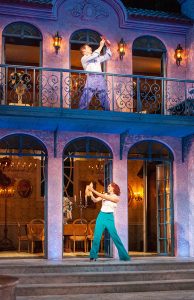 Not only is it one of my favorite Shakespeare plays, but Much Ado About Nothing contains a favorite character: Dogberry. This bumbling constable arrives much later in the play than the famous sparring couple Beatrice and Benedick, and adds an enormous amount of comic energy to a play that is already awash in lovemaking, spying, revenge, matchmaking, duplicity, and more. Old Globe’s colorful, playful production also proves that this a great introductory play for those who find Shakespeare — shall we say — challenging. Plus, the warring couple at the heart of the play, both of whom are being duped into thinking that they are in love with each other, have dialogue worthy of the best from The Taming of the Shrew’˜s Petruchio and Kate. Additionally, there’s heroines, villains, and music (aside from the 1930s’ Hit Parade, there’s a new up-tune composition by Broadway’s Stephen Flaherty for the madrigal “Sigh No More”). But in this roaring party there is a sudden turn where things get very real and very dark. It is this dichotomy that allows clownish physical comedy to live right alongside very real dramatic tension.
Not only is it one of my favorite Shakespeare plays, but Much Ado About Nothing contains a favorite character: Dogberry. This bumbling constable arrives much later in the play than the famous sparring couple Beatrice and Benedick, and adds an enormous amount of comic energy to a play that is already awash in lovemaking, spying, revenge, matchmaking, duplicity, and more. Old Globe’s colorful, playful production also proves that this a great introductory play for those who find Shakespeare — shall we say — challenging. Plus, the warring couple at the heart of the play, both of whom are being duped into thinking that they are in love with each other, have dialogue worthy of the best from The Taming of the Shrew’˜s Petruchio and Kate. Additionally, there’s heroines, villains, and music (aside from the 1930s’ Hit Parade, there’s a new up-tune composition by Broadway’s Stephen Flaherty for the madrigal “Sigh No More”). But in this roaring party there is a sudden turn where things get very real and very dark. It is this dichotomy that allows clownish physical comedy to live right alongside very real dramatic tension.
One of Shakespeare’s mid-career plays, Much Ado About Nothing comes after The Comedy of Errors, Love’s Labour’s Lost and A Midsummer Night’s Dream, before he turned to more serious themes with his great tragedies. There is little to darken the consistent mirth of this accessible comedy. It hinges on two schemes. One is to convince Beatrice and Benedick they are in love. The other is two prevent the marriage of Hero and Claudio. All this occurs when Don Pedro, Prince of Aragon, on his way home with his army, stops at the home of his friend, Leonato, the governor of Messina.
Leonato (René Thornton Jr.) lives with his niece, Beatrice (Sara Topham) and his daughter, Hero (Morgan Taylor). Claudio (Carlos Angel-Barajas), one of Don Pedro’s soldiers, immediately falls in love with Hero and seeks to marry her. Benedick (Michael Hayden), another of Don Pedro’s soldiers, sees Beatrice and remembers their long-standing antipathy.
Claudio, Leonato, and Don Pedro (Michael Boatman), together with Hero and her governess Ursula (Larica Schnell) and waiting-gentlewoman Margaret (Nora Carroll), concoct a plan to bring Benedick and Beatrice together. In the meantime, Don Pedro’s bastard brother, Don John (Manoel Felciano), and Don Pedro’s servants, Borachio (Eric Weiman) and Conrade (Yadira Correa), contrive to convince Claudio that Hero has been false.
The sharp-tongued Beatrice and her worthy sparring partner Benedick have innocent and naïve counterparts in the pure Hero and the easily duped Claudio. The two couples may be the heart of the play, but a very good supporting cast gives the comedy some of its darker, more affecting, and most delightfully ridiculous moments. Felciano gives us a deliciously evil Don John, ably assisted by Weiman as Borachio (Correa’s Conrade is inexplicably ghettoized in manner and speech, making her a glaring miscast that hurls us out of the show). Fred Applegate is an understated but estimable clown as Dogberry, the constable of the Watch, who despite his bungling stupidity manages to save the day. His trumpet-blaring old crony, James Newcomb as Verges, also gets laughs — but their trio of Watches (Samantha Sutliff, Jose Martinez, Jersten Seraile) — are too contemporary and lack distinction. No dissertation here, but the strange pairing of two brothers as black and white instead of siblings that are both black or both white feels — as with some of the other ensemble members — like casting for the sake of diversity, not the best actors for the roles. Our world has gone beyond color-blind casting to casting for the sake of inclusion, and it’s affecting the quality of the most important ingredient: the best cast we can get.
In director Kathleen Marshall’s production, John Lee Beatty’s outdoor set turns the stage and its surroundings into the villa and gardens of a wealthy Italian gentleman in the early ’30s, complete with balcony, working fountains and cypress trees pocked with tiny lights. The pre-fascist dress from costume designer Jane Greenwood is complete with bright summer dresses and elegantly trimmed uniforms.
While the technical elements are magical (especially Stephen Strawbridge’s lighting), this show belongs to Hayden and Topham, who not only manage to convey love and scorn in equal measure but also retain our esteem and respect through all their foolishness. Their chemistry is undeniable. Watching them perform their verbal gymnastics, one cannot help but note how totally modern they seem. This is a tribute both to both Shakespeare and this excellent production that keeps him alive.
photos by Jim Cox
Much Ado About Nothing
Old Globe’s Lowell Davies Festival Theatre
1363 Old Globe Way in San Diego’s Balboa Park
ends on September 16, 2018
for tickets, call 619.234-5623 or visit The Old Globe
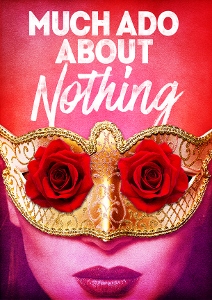
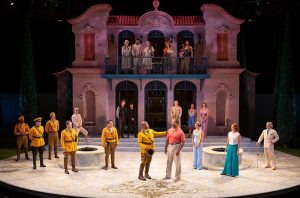
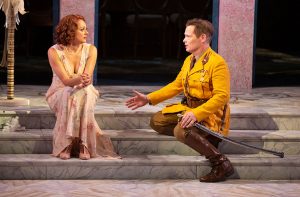
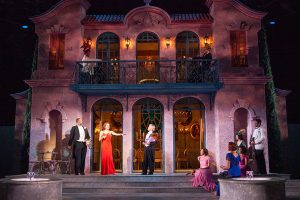
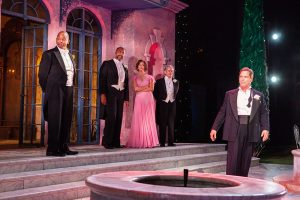
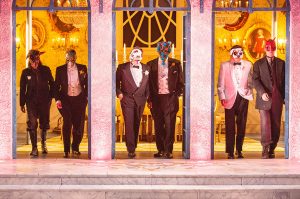
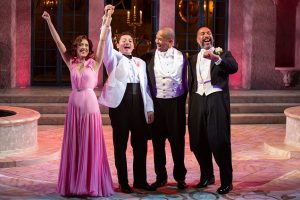
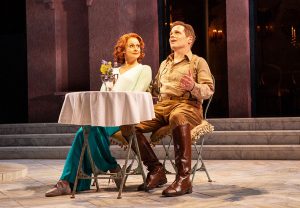
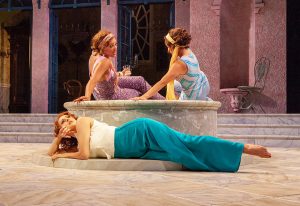
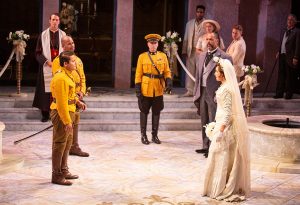
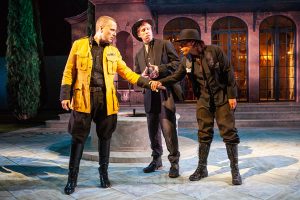
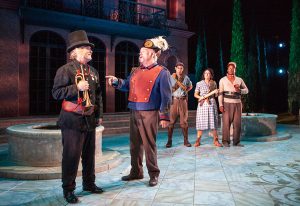
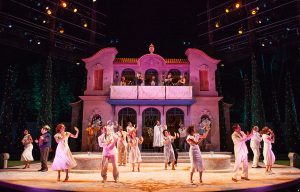

{ 1 comment… read it below or add one }
I’m deeply honored that Much Ado‘s costume design is credited to the great Jane Greenwood, our deity, but in fact they were only inspired by her lifetime of beautiful work. The costumes were my design.